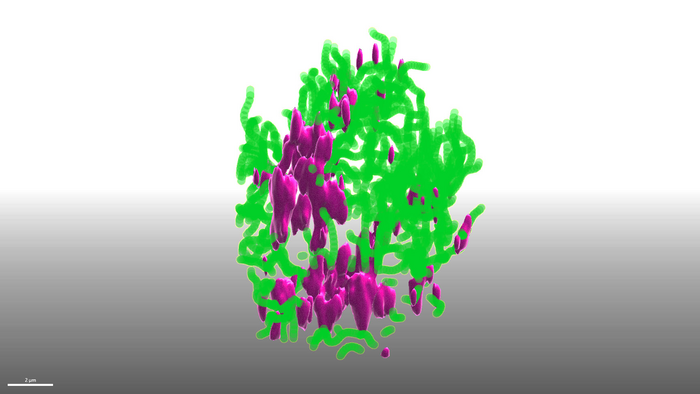CHAPEL HILL, NC – The great hope of cancer immunotherapy is to bolster our own immune cells in specific ways to keep cancer cells from evading our immune system. Although much progress has been made, immunotherapy does not always work well. Jessica Thaxton, PhD, MsCR, in the immunotherapy group at the UNC Lineberger Comprehensive Cancer Center, wants to know why. She thinks one reason is the stress response experienced by T cells once they infiltrate solid cancers.

Credit: Elizabeth Hunt, UNC School of Medicine
CHAPEL HILL, NC – The great hope of cancer immunotherapy is to bolster our own immune cells in specific ways to keep cancer cells from evading our immune system. Although much progress has been made, immunotherapy does not always work well. Jessica Thaxton, PhD, MsCR, in the immunotherapy group at the UNC Lineberger Comprehensive Cancer Center, wants to know why. She thinks one reason is the stress response experienced by T cells once they infiltrate solid cancers.
The Thaxton lab’s latest work, published in the journal Cancer Research, shows in detail how the stress response in T cells can lead to their inability to curtail tumor growth. Thaxton’s group found that T cells exposed to the environment of solid cancers undergo a natural response to stress that shuts off their function, limiting T cell ability to kill tumors. By manipulating multiple proteins in the stress response pathway inside T cells, Thaxton’s team showed that it was possible to overcome the intrinsic T cell stress response to allow the immune system to thwart cancer growth.
At the center of this research is a protein called PKR ER-like kinase (PERK), which is a major stress sensor for all cell types, including T cells, but has not been deeply studied in the context of immunity. That is, when a T cell is under duress – like when faced with the hostile environment created by cancer cells – it is PERK that responds to the stress in a way that causes cells to stop secreting proteins in an effort to help the cell survive.
“Halting protein translation is protective in most cells and is part of the acute arm of the T cell’s stress response,” said Thaxton, senior author of the paper and associate professor of cell biology and physiology at the UNC School of Medicine. “Everything in the scientific literature indicates that the acute arm of the PERK-mediated stress response aims to protect cells in hostile environments.”
But Thaxton’s group hypothesized that – in the context of tumor suppression – this natural T cell stress response would be detrimental to effective tumor immunotherapy.
“T cells are among the body’s most highly secretory cells, producing approximately 800,000 proteins per minute in states of activation against foreign invaders,” she said. “In order for immunotherapy to be effective, T cells have to secrete things such as cytotoxic cytokines in order to kill tumor cells.”
She postulated that the PERK response could be halting protein secretion in a way that made T cells less effective at combating tumors.
In 2019, Thaxton’s lab created T cells devoid of PERK and transfused these cells into tumor-bearing hosts and found that T cells incapable of experiencing the stress response through PERK were very good at controlling tumor growth. Using animal models, the group also showed that the efficacy of clinically utilized immunotherapies could be increased by the addition of PERK inhibition, further demonstrating that PERK impairs effective immunotherapy.
This led her group to conduct experiments to determine if PERK itself was responsible for poor T cell tumor control or if other actors in the signaling pathway initiated by PERK could be responsible for the inhibition of protein secretion in T cells, as proteins inside cells operate through a complicated cascade of interactions.
Thaxton’s lab found that when PERK is activated, modification of one molecule called p-eIF2 alpha is responsible for the T cell momentarily stopping protein synthesis during the stress response. When Thaxton’s lab forced p-eIF2 alpha to cease its natural function, the T cells continued protein synthesis, and T cells were able to continue to control tumor growth in mice.
“This work is part of our quest to dissect the PERK axis to understand the role that this stress sensor plays in orchestrating T cell function in cancers. We aim to discern the most potent therapeutic targets within the PERK cascade to develop unique avenues to improve immunotherapy efficacy,” Thaxton said.
Thaxton’s research shows that it is very possible to tweak T cells genetically or pharmacologically to enhance their ability to battle cancer tumor cells. This work also shows the importance of studying the basic cell biology and bioenergetics of cells on the front lines of cancer therapeutics.
“We think it is important to understand, from a molecular and cell biologist’s view, why some immunotherapies are not working as well as we thought they would,” said Thaxton. “Yet, until now, some basic cell biology principles and phenomena surrounding how cells behave in response to stress, have been overlooked in immune cells.”
Other authors are Brian Riesenberg, Elizabeth Hunt, Katie Hurst, Megan Tennant, Alex Andrews, Lee Leddy, David Neskey, Elizabeth Hill, Guillermo Rangel Rivera, Chrystal Paulos, and Peng Gao. The National Institutes of Health funded this study.
Journal
Cancer Research
DOI
10.1158/0008-5472.CAN-22-1744
Method of Research
Experimental study
Subject of Research
Animals
Article Title
Stress-Mediated Attenuation of Translation Undermines T-cell Activity in Cancer
Article Publication Date
2-Dec-2022




